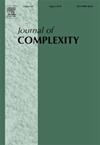Nonparametric conditional U-statistics on Lie groups with measurement errors
IF 1.8
2区 数学
Q1 MATHEMATICS
引用次数: 0
Abstract
This study presents a comprehensive framework for conditional U-statistics of a general order in the context of Lie group-valued predictors affected by measurement errors. Such situations arise in a variety of modern statistical problems. Our approach is grounded in an abstract harmonic analysis on Lie groups, a setting relatively underexplored in statistical research. In a unified study, we introduce an innovative deconvolution method for conditional U-statistics and investigate its convergence rate and asymptotic distribution for the first time. Furthermore, we explore the application of conditional U-statistics to variables that combine, in a nontrivial way, Euclidean and non-Euclidean elements subject to measurement errors, an area largely uncharted in statistical research. We derive general asymptotic properties, including convergence rates across various modes and the asymptotic distribution. All results are established under fairly general conditions on the underlying models. Additionally, our results are used to derive the asymptotic confidence intervals derived from the asymptotic distribution of the estimator. We also discuss applications of the general approximation results and give new insights into the Kendall rank correlation coefficient and discrimination problems.
具有测量误差的李群的非参数条件u统计量
本研究提出了一个综合框架的条件u统计量的一般顺序在李群值预测影响测量误差的背景下。这种情况出现在各种现代统计问题中。我们的方法基于对李群的抽象谐波分析,这是统计研究中相对较少探索的一个设置。在一个统一的研究中,我们首次引入了一种创新的条件u统计量的反卷积方法,并研究了它的收敛速度和渐近分布。此外,我们探讨了条件u统计的应用,以一种非平凡的方式,将欧几里得和非欧几里得元素与测量误差相结合的变量,这是统计研究中很大程度上未知的领域。我们得到了一般的渐近性质,包括各种模态的收敛速率和渐近分布。所有结果都是在基本模型的相当一般的条件下建立的。此外,我们的结果用于导出由估计量的渐近分布导出的渐近置信区间。我们还讨论了一般近似结果的应用,并对肯德尔等级相关系数和判别问题给出了新的见解。
本文章由计算机程序翻译,如有差异,请以英文原文为准。
求助全文
约1分钟内获得全文
求助全文
来源期刊

Journal of Complexity
工程技术-计算机:理论方法
CiteScore
3.10
自引率
17.60%
发文量
57
审稿时长
>12 weeks
期刊介绍:
The multidisciplinary Journal of Complexity publishes original research papers that contain substantial mathematical results on complexity as broadly conceived. Outstanding review papers will also be published. In the area of computational complexity, the focus is on complexity over the reals, with the emphasis on lower bounds and optimal algorithms. The Journal of Complexity also publishes articles that provide major new algorithms or make important progress on upper bounds. Other models of computation, such as the Turing machine model, are also of interest. Computational complexity results in a wide variety of areas are solicited.
Areas Include:
• Approximation theory
• Biomedical computing
• Compressed computing and sensing
• Computational finance
• Computational number theory
• Computational stochastics
• Control theory
• Cryptography
• Design of experiments
• Differential equations
• Discrete problems
• Distributed and parallel computation
• High and infinite-dimensional problems
• Information-based complexity
• Inverse and ill-posed problems
• Machine learning
• Markov chain Monte Carlo
• Monte Carlo and quasi-Monte Carlo
• Multivariate integration and approximation
• Noisy data
• Nonlinear and algebraic equations
• Numerical analysis
• Operator equations
• Optimization
• Quantum computing
• Scientific computation
• Tractability of multivariate problems
• Vision and image understanding.
 求助内容:
求助内容: 应助结果提醒方式:
应助结果提醒方式:


